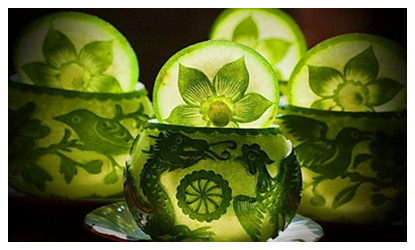Skype: neodalle-travel
Tel: +86 135 7447 2266
E-mail: sales@visitaroundchina.com

Boasting a long history, Jingzhou carved preserved fruit is the product of women’s superb craftsmanship. Unripe pomelo is the most common fruit to be caved and preserved. It will be first cut into slices, on which a variety of patterns including dragon, phoenix, fish, shrimp, flower, birds, insects and leaves are carved. Later, slices will be mixed with white sugar or honey after rinsing and dry them in the sun.
Besides unripe pomeloes, a variety of vegetables can be made for preserved ones, including white gourd, cucumber, snake melon, tomato, bitter gourd, red bean, sword bean.
 Jingzhou carved preserved fruit (vegetable) boasts a delicious taste and can help to moisturize the lungs and promote the secretion of saliva.
Jingzhou carved preserved fruit (vegetable) boasts a delicious taste and can help to moisturize the lungs and promote the secretion of saliva.
In March 2009, the craftsmanship of Jingzhou carved preserved fruit (vegetable) was included in the second batch of Hunan Provincial Intangible Cultural Heritage Items.
Jingzhou carved preserved fruit (vegetable) is a kind of ethnic food with unique features, and an exquisite handiwork. It is a perfect combination of cuisine culture and ethnic culture. Originated from East Zhou Dynasty (770 B.C. - 249 B.C.) and prevailed in late Five Dynasties, the preserved fruit (vegetable) has been selected as an imperial tribute to the Royal Court for generations. The making technique is mainly passed down by inheritors living in Quyang Town of Jingzhou Miao Autonomous County in southwest Hunan and its surroundings.
 Ask Questions ?
Ask Questions ?